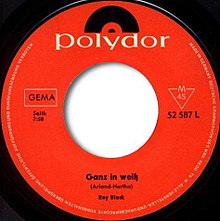All in white
|
Chart positions Explanation of the data |
||||||||||||||||||
| Singles | ||||||||||||||||||
|
||||||||||||||||||
All in white is the title of a million-seller by German pop singer Roy Black , who became the most successful title of 1966 in Germany in the midst of the beat wave .
History of origin
Roy Black was discovered on August 20, 1964 during a performance with his backing band "Canons" by Polydor producer Hans Bertram and signed on September 1. The first single Sweet Baby mein / My Little Girl (Polydor # 52400) went largely unnoticed by the public; only 1,200 copies were sold. The breakthrough came in April 1965 with the release of the single You are not alone / Believe in me (# 52475). This reached number four on the German charts and was sold over 800,000 times.
German-language hits at that time had little chance of being accepted by the young audience. Of the 30 number one hits of 1966, only six (i.e. 20%) were German production, including Ganz in Weiß . Ten years earlier the situation was reversed, because among the again 30 top hits of 1956, only one foreign production was represented.
Roy Black's title appealed to the affluent adult audience in particular. Book author Arno Löb offers another attempt to explain the success against the music trend. Roy Black's initial successes were due in particular to Elisabeth Bertram , the manager's wife. As a presenter at Radio Luxemburg, she had a great influence on the program and preferred to play her husband's records.
Roy Black manager Hans Bertram received a demo recording of the title All in white / I'm looking for you , the A-side of which is about a dreamed romantic wedding in white clothes. The verses by the experienced songwriter Kurt Hertha and the music by Rolf Arland (who wrote a total of 39 tracks for Black) were brought together by his son Henry Arland to create a violin-based melody. The recordings were exhausting for Roy Black, so that he quickly got out of breath.
Publication and Success
A week after its publication in January 1966 (Polydor # 52587) 80,000 copies were already marketed, after two weeks sales had doubled. In total, the record was sold 2.5 million times, including over a million times in Germany alone, making it one of the best-selling singles in Germany . In Germany, Black received a platinum record from his music label for the success of Ganz in Weiß . On February 5, 1966, the title made it into the German charts, on March 12, 1966 it reached the first rank there, which it held until March 26, 1966. A week later, the Rolling Stones replaced him from first place. In the top 10 on March 19, 1966, apart from Roy Black, only one other German title was represented. The title was also included on the 1966 music album Roy Black (Polydor # 249057), which was listed in second place on the German album charts .
Cover versions
There are at least 21 cover versions of Ganz in Weiß. Roy Black himself also has an English version with the title I Need You from 1966 and an Italian version with the title Grazie mille (also 1966). In 1966, Östen Warnerbring published a Swedish version called En sommardröm . German cover versions have been published by Fred Frohberg (1995), Frank Zander (2005), Dieter Thomas Kuhn (2007) and Der Familie Popolski (2008) , among others . The German punk band Heiter bis Wolkig published a parody in 1992 under the title Ganz in Schwarz , Geier Sturzflug used the melody in 2004 for their song Arbeitslos . The Grindcore band Excrementory Grindfuckers released their album Ready to go, scene cleaning! two parodies with the title Ganz in Grind , one of which was ascribed to her side project Nebelmacht and musically based on Nordic Black Metal and the other is acoustically designed.
Individual evidence
- ↑ a b Sources chart placements: DE / AT , (accessed on June 26, 2010)
- ^ Taurus Press, Hitbilanz - Deutsche Chart Singles 1956 to 1981 , 1983, p. 367
- ↑ Arno Löb, Sweet Baby Mine - Roy Black's wild youth , 1996
- ^ Bettina Greve, Sternenhimmel - Polydor: The Chronicle of a German Record Brand , 2001, p. 147
- ↑ NDR television, The most popular cult hits ( page no longer available , search in web archives ) Info: The link was automatically marked as defective. Please check the link according to the instructions and then remove this notice.
- ↑ The tragic story of a dream man. focus.de, October 9, 2011, accessed on September 12, 2019 .
- ^ Günter Ehnert: Hit balance sheet - German chart singles 1956-1980 . 1st edition. Verlag popular music-literature, Norderstedt 2000, ISBN 3-922542-24-7 , p. 443 .
- ↑ www.coverinfo.de Cover info about All in White
